Amid the growing surge of Zika research, the University of Pittsburgh School of Medicine has announced early success with two experimental vaccines that prevented the pups of immunized female mice from becoming infected with the virus.
Both vaccines, with one more effective than the other, succeeded in producing an immune response to the virus that was transferred from mother to her pups. That would represent an important goal in a human vaccine, given the severe neurological birth defects including microcephaly (an abnormally small head) and Guillan-Barre syndrome that the viral infection can cause.
“We’ve not only developed a promising vaccine candidate to move toward larger pre-clinical and, eventually, human clinical trials, but also a delivery format that would be inexpensive to produce and distribute to hundreds of thousands of people,” said Andrea Gambotto, an associate professor of surgery at the medical school who was senior author of the study, published online yesterday in the EBioMedicine journal.
The US Congress recently allocated US$1.1 billion for Zika research, money that Pitt researchers hope to tap to advance their vaccines to human clinical trials, potentially within a year, Dr. Gambotto said.
The Pitt focus is creating a vaccine given to the mother that protects the fetus and newborn against birth defects. So far, so good.
“Pups born to mice immunized with [the one Pitt vaccine] were all protected against lethal challenge infection without weight loss or neurological signs,” while 50 percent of the pups born to dams immunized with the second Pitt virus were protected, the study says.
One vaccine involved a standard injection. The other used crystals affixed to a patch similar to a Band-Aid to keep them in contact with the skin until they dissolved.
The vaccines generate an immune response against an antigen — a protein — on the outer shell of the virus. The Pitt study describes the immunization as “a promising candidate vaccine” for the prevention of Zika virus disease.
Bites from mosquitoes of the Aedes species represent the key method of viral transmission, with sexual transmission also possible. Various South American, Central American and Caribbean nations are experiencing epidemic levels of infection. The virus already has spread to 50 nations.
The National Institute of Allergy and Infectious Diseases currently is working on five Zika vaccines, with the August 2 launch of a human clinical trial.
Once a vaccine is developed, it typically is tested in mice then monkeys. If successful, the next step is three phases of human clinical trials to determine safety and effectiveness before it goes before the US Food and Drug Administration for approval. Even if the institute’s vaccine proceeds on the current fast track, its effectiveness on humans won’t be clear until early to mid-2018, said institute director Anthony S. Fauci. (Pittsburgh Post-Gazette)
Read more: http://www.caribbean360.com/news/two-promising-zika-vaccines#ixzz4MAmGsVM7














